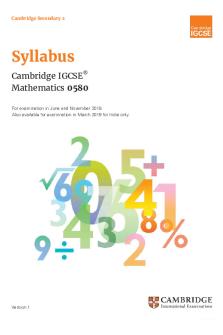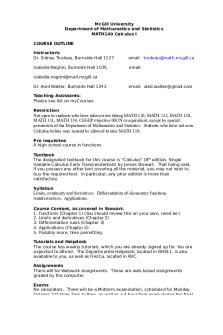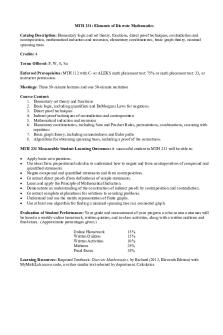Math 1152 Flipped Sp20 Syllabus PDF

| Title | Math 1152 Flipped Sp20 Syllabus |
|---|---|
| Author | Anonymous User |
| Course | Calculus II |
| Institution | Ohio State University |
| Pages | 6 |
| File Size | 213.3 KB |
| File Type | |
| Total Downloads | 107 |
| Total Views | 164 |
Summary
Syllabus...
Description
Mathematics
Syllabus: Math 1152 Flipped and Flexible –
College of Arts and Sciences
Spring 2020 This course is offered in hybrid format to on-campus students with an option of completing all course components from a distance for students who are not on campus.
Instructors For more information about your recitation instructor, please see Carmen. Online Lecturer: Alexander Borland Email Address: [email protected] Office Location: Math Tower 649
Course Materials Required Text: Ximera Calculus II (free online access through Canvas) Optional Text 1: Active Calculus (https://activecalculus.org/) Optional Text 2: Paul’s Online Math Notes (http://tutorial.math.lamar.edu/Classes/CalcII/CalcII.aspx) Please note that the Ximera textbook has been written by experienced OSU instructors in order to align with the course. You are not responsible for any topics covered in the optional texts that are not on the calendar or in Ximera. These optional texts are listed in order for you to have alternate presentations of the material.
MSLC FREE TUTORING HOURS The Mathematics and Statistics Learning Center offers free tutoring services during the semester in Cockins Hall (CH) 014. For information about hours, please go to: https://mslc.osu.edu/courses/math/1152
Course Prerequisites: Mathematics 1151 (with grade C‐ or better), equivalent transfer credit from another college or university as determined by the Math Advising Office ( https://math.osu.edu/undergrad/advising-office), or Course Code L on the Math Placement Test.
GE Information: This mathematics course can be used, depending on your degree program, to satisfy the Quantitative and Logical Skills category of the General Education Requirement (GE).
Course Learning Objectives: To understand the basic techniques and applications of Integral Calculus, including applications of integration, integration techniques, sequences and series, Taylor series and their applications, working with parametric equations and polar coordinates, developing the component description of vectors, working with functions of several variables.
Course Management System: We will be using Carmen Canvas for this course. The department will communicate directly to you through Announcements on Canvas. We make a concerted effort to discuss important course information with your
2
lecturers and TAs, but the only means by which we can communicate our expectations directly to you is through the Announcements section. Anything in the Announcements section signed “The OSU Math Department” is a message directly from the people who write your quizzes and exams! You should check the Announcements section daily!
Learning Path: In this hybrid/distance course, you will learn the course material through the following progression of activities for each course topic: 1.
Watch the online lesson for the topic. Take notes. Complete the embedded questions to check your understanding. Look at the lesson learning objectives when you finish the lesson. How well do you understand these learning objectives?
2. Complete your Ximera textbook chapter on this section. 3. Complete the Ximera homework questions on this lesson. These questions are standard problems that you should be able to complete following the explanation and examples in the online lessons and the help available in your textbook. 4. Attend recitation on the topic. Here you can ask questions on the topic and we will work on examlevel questions in groups during class time. 5. Complete the recitation handouts on your own. Compare your work with the written solutions provided. The problems get more difficult as you move through this Learning Path. You want to make sure you are able to do the exam-level questions on the recitation handouts by the time you take quizzes and exams on the material. Do not fall behind. Do not try to rush through the assignments. Ask questions as soon as you get stuck. Log into Carmen Canvas every week day for announcements and discussion posts.
Comparison to other sections of Math 1152: This section will have the same number of points for recitation (non-exam) scores, but those points will be earned differently than in other sections. Students in this section will take the same common evening exams as all the other sections.
Grades: Math 1152 will use a percent based system to determine course grades. Each type of assessment (Exams, Quizzes, Projects, Homework, etc) will count as a certain percent of your final grade. To figure out your score for each category, please do the following. 1. Take the number of points you earn and divide by the number of points possible in that category. 2. Multiply this by the total percentage listed below. This will be your score for that category. For instance, if you score a 180/200 on the Final Exam, you would have a 90% on the Final. The final counts as 30% of your final score. Of this 30%, you would earn .9*30 = 27 To get your final course grade, calculate your score in each category and add them together.
3
Assignment or category
Percent of Final Grade
Final Exam
25%
Midterms
45% (15% each)
Quizzes (10)
6% (drop 1)
Online Lessons
3% (drop 3)
Online Textbook Completion
4% (drop 2)
Review Assignments
2%
Weekly Homework
8% (drop 2)
Recitation Participation
3%
Projects (2)
4% (2% each)
Bonus Surveys
1%
Total
101%
You will notice that there is an extra 1% built in to the course. Please be careful when using Canvas to project final course percentages; failure to count ungraded assignments as zeros as well as other factors may lead to a discrepancy.
Grading Scale: A AB + B
Above 93 90-93 87-90
BC+ C
80-83 77-80 73-77
83-87
C-
70-73
D+ D E
67-70 60-67 Below 60
This grading scale will not be raised. Individual assignments, including exams, will not be curved nor adjusted. The final grading scheme could be adjusted at the end of the semester. Thus, please note: Neither your lecturers nor your TAs are able to answer any questions regarding grade adjustments until after ALL of the course grades have been entered. Class participation and effort will be important factors in decisions about borderline grades.
Online Lessons: In this class, instead of attending lecture on Mondays, Wednesdays, and Fridays, you will watch online interactive lessons streamed from the internet. These include videos, slides, and questions to help you assess your understanding. In some places, the lessons also include choices on how much help you feel you need with a particular topics. You are required to work through the assigned lessons (these videos are part of your grade). This is where you learn the course material. To ensure this, you are asked to answer several comprehension questions from the videos within the lessons. These are automatically graded and comprise your online interactive lesson score. Be warned that if you miss a quiz question in the lesson, it might decide for you that you need the extra help! (This is the flipped part of the course. You receive the instruction at home and then work on problems during class time.) The three lowest online lesson grades will be dropped.
4
Recitations: On Tuesdays and Thursdays, you will attend recitation on the previous days’ lesson(s). This recitation will be held live at your particular scheduled time. This is where you can ask questions and practice using the course material you have learned in the online lessons and Ximera homework. The recitations will be group work based and interactive. You will be graded for your recitation participation. If you are on-campus this term, you should attend recitation in-person. If you plan to attend recitation online, you should inform your instructor ahead of time. Acceptable reasons for attending recitation online include but are not limited to: high school students attending from their high school, regional campus students, fulltime working adults, being sick, and being out of town. Online students will be assigned to work in a group with other online students for the day. If you attend online but do not actively engage you will not receive recitation points. If you attend recitation online, you will attend through a web-based program called Zoom. Students who attend recitation online are responsible for making sure their technology works ahead of time. This means you should log into the online recitation classroom on the computer you plan to use for recitation prior to the recitation time. If you have technical issues, you should email the lecturer, Alex Borland.
Online Homework: All homework for this course is accessible through Canvas under the Assignments tab. Due dates for each assignment are listed on the course calendar. There are three types of homework for this course.
1. Most Monday nights and on the Wednesday of exam weeks, there will be a portion of the textbook that must be completed by 11:59 PM. It is highly encouraged that you work on the relevant sections of the textbook before going to lecture and complete them later that day. 2. Every Wednesday night, there will be an assignment due at 11:59 PM that covers important material from the previous week’s lectures. There are both conceptual and computational questions, ranging from easy to difficult. There additionally may be questions that draw on material from previous sections of the course. 3. Most Friday nights, there will be an assignment due at 11:59 PM that covers important material from Pre-calculus and Calculus. Many students struggle with new material because of difficulties with prerequisite material. These assignments are designed to review that material. The first Monday of the semester, there is a comprehensive assignment that reviews the important prerequisite material. The following assignments will be shorter and focus on the prerequisite material that will be relevant for the coming week’s lectures. Late homework assignments will not be accepted except in the instance of a documented emergency. Sometimes, grade syncing issues may arise between Ximera and the Canvas gradebook. Students have two weeks after any affected assignments are due to inform their instructors of a discrepancy. After this time, no changes to the Canvas gradebook will be made.
Projects: There will be two projects that explore the course material more deeply. The due dates are listed on the calendar. The first project will examine applications of integration, and the second will explore financial applications of (finite) geometric sums. The material from the first project is relevant for the first midterm, but the material for the second project will not be covered on any quizzes, midterms, nor the final exam. You are highly encouraged to work on these together and ask your instructors for help. Each project will be worth 30 points towards the project total grade and late projects will be penalized at 10 points per day late.
5
Quizzes: Quizzes will be given in recitation. Each quiz will generally cover the content from the Wednesday and Friday of the week prior, and the content of the current week’s Monday lecture. All quizzes in Flipped and Flexible are take-home. They typically will become available in Carmen on Thursdays at 6:00pm and are due Friday at 11:59pm. Quizzes must be turned in through Gradescope. If you have technical problems, please e-mail the quiz to your recitation instructor before the quiz is due and figure out how to fix the problem before the next quiz. Some quizzes may have two parts. The date that each quiz will be released is listed on the calendar; they are always due the next day. You may drop your lowest quiz score.
Exams: Exams will consist of true/false, multiple choice, short answer, and free-response problems. A study guide covering the topics for each exam will be posted on Canvas at least one week prior to the exam. The location of the exams will be announced a week before each midterm. Students are required to bring their IDs to the exam.
Exam
Date and time
Make-Up
Midterm 1
Thursday, January 30 from 7:05-8:20 PM
Friday, January 31 from 7:40-8:55 AM
Midterm 2
Thursday, March 5 from 6:30-7:45 PM
Friday, March 6 from 7:40-8:55 AM
Midterm 3
Thursday, April 9 from 6:30-7:45 PM
Friday, April 10 from 7:40-8:55 AM
Final Exam
Wednesday, April 22 from 8:00-9:55 PM
Thursday, April 23 from 7:40-8:55 AM
It is your responsibility to check Canvas regularly. The department will be making frequent announcements and any material posted is highly important for quizzes and exams! Make-up Policy: Make up exams and quizzes will only be given in circumstances in which the student’s absence is justifiable and well-documented. Excuses due to illness must be accompanied by a doctor’s note. Students should contact their instructor as soon as possible in the event a makeup is needed and should always contact the instructor before the exam is given. Documentation of the emergency is required in order for make-up exams and quizzes to be considered for credit.
Calculator Policy: Calculators will NOT be permitted during exams and quizzes. Cell phones, iPads, and all other web-enabled and electronic devices are also prohibited during exams.
Other Course Policies Technology Problems It is inevitable that technology will sometimes malfunction. Students are responsible for beginning assignments early enough to have time to ask for help with technical issues. Although reasonable accommodations for students will be made when there are technical issues, the student will be responsible for documenting errors and seeking help in a timely fashion from both technical support and the instructor as
6
needed. No accommodations will be made for students who do not work actively to resolve their technical problems in a timely fashion. Students who experience technical problems with Carmen or CarmenConnect should contact Carmen Support at 8–HELP or visit https://carmen-services.it.ohio-state.edu/carmen-help/students/. Students who experience problems with Ximera should contact their instructors immediately.
Student participation expectations You are expected to check Carmen at least once every 24 hours on weekdays . You should plan on working on this course every school day. There are frequent deadlines in this course, and students are expected to keep track of all deadlines. Students are expected to work ahead of those deadlines whenever possible to prevent last-minute problems. Students are expected to attend all recitation meetings.
Academic Misconduct Statement It is the responsibility of the Committee on Academic Misconduct to investigate or establish procedures for the investigation of all reported cases of student academic misconduct. The term “academic misconduct” includes all forms of student academic misconduct wherever committed; illustrated by, but not limited to, cases of plagiarism and dishonest practices in connection with examinations. Instructors shall report all instances of alleged academic misconduct to the committee (Faculty Rule 3335-5-48.7). For additional information, see the Code of Student Conduct at http://studentlife.osu.edu/csc/.
Disability Services Statement
The University strives to make all learning experiences as accessible as possible. If you anticipate or experience academic barriers based on a disability (including mental health, chronic or temporary medical conditions), please let your instructors know immediately so that they can privately discuss options. To establish reasonable accommodations, it is required that you register with Student Life Disability Services. After registration, make arrangements with your instructors as soon as possible to discuss your accommodations so that they may be implemented in a timely fashion. SLDS contact information: [email protected]; 614-2923307; 098 Baker Hall, 113 W. 12th Avenue....
Similar Free PDFs

Math 1152 Flipped Sp20 Syllabus
- 6 Pages

K103-syllabus SP20 - Syllabus
- 21 Pages

BIOL2syll-Sp20 - syllabus
- 2 Pages

COMM MOVI 200 SP20 - Syllabus
- 14 Pages

Flipped-final - FLIPPED FINAL
- 6 Pages

SP20 SOCY 301 Syllabus Working
- 5 Pages

Math syllabus
- 40 Pages

Math 171 Syllabus - syll
- 3 Pages

Math Standard Syllabus
- 96 Pages

Syllabus MATH 140
- 2 Pages

Math 111 F21 - Syllabus
- 7 Pages

MATH 165 Syllabus
- 9 Pages

Math gre w2015 syllabus
- 2 Pages

Syllabus Math 221
- 4 Pages

Math 114 Course Syllabus
- 9 Pages

Discrete math syllabus
- 2 Pages
Popular Institutions
- Tinajero National High School - Annex
- Politeknik Caltex Riau
- Yokohama City University
- SGT University
- University of Al-Qadisiyah
- Divine Word College of Vigan
- Techniek College Rotterdam
- Universidade de Santiago
- Universiti Teknologi MARA Cawangan Johor Kampus Pasir Gudang
- Poltekkes Kemenkes Yogyakarta
- Baguio City National High School
- Colegio san marcos
- preparatoria uno
- Centro de Bachillerato Tecnológico Industrial y de Servicios No. 107
- Dalian Maritime University
- Quang Trung Secondary School
- Colegio Tecnológico en Informática
- Corporación Regional de Educación Superior
- Grupo CEDVA
- Dar Al Uloom University
- Centro de Estudios Preuniversitarios de la Universidad Nacional de Ingeniería
- 上智大学
- Aakash International School, Nuna Majara
- San Felipe Neri Catholic School
- Kang Chiao International School - New Taipei City
- Misamis Occidental National High School
- Institución Educativa Escuela Normal Juan Ladrilleros
- Kolehiyo ng Pantukan
- Batanes State College
- Instituto Continental
- Sekolah Menengah Kejuruan Kesehatan Kaltara (Tarakan)
- Colegio de La Inmaculada Concepcion - Cebu